人教版九年级全册Unit 4I used to be afraid of the dark.Period 1(Section A 1a-2d)知识点课件(共14张PPT)
文档属性
| 名称 | 人教版九年级全册Unit 4I used to be afraid of the dark.Period 1(Section A 1a-2d)知识点课件(共14张PPT) | 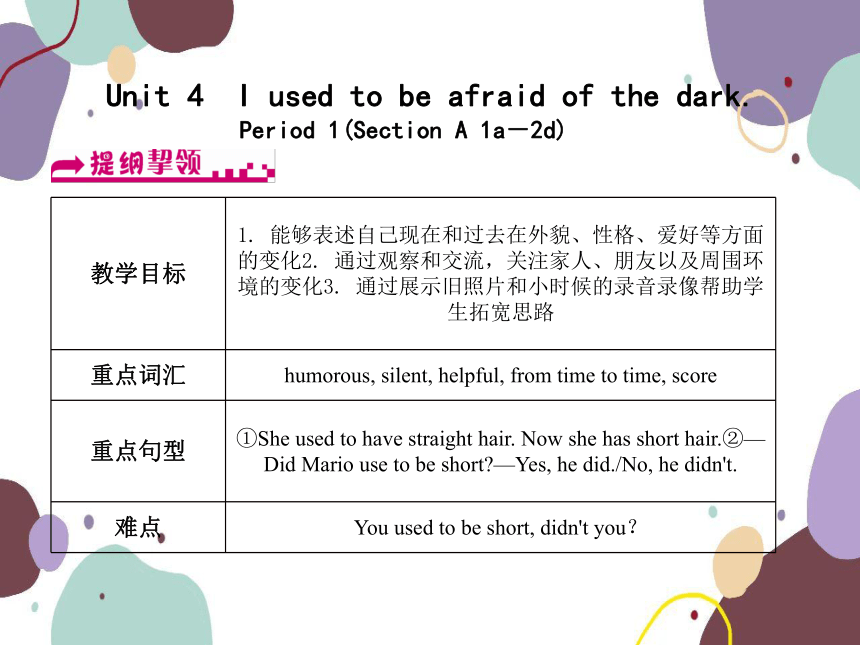 | |
| 格式 | pptx | ||
| 文件大小 | 223.5KB | ||
| 资源类型 | 教案 | ||
| 版本资源 | 人教新目标(Go for it)版 | ||
| 科目 | 英语 | ||
| 更新时间 | 2022-10-20 13:23:57 | ||
图片预览

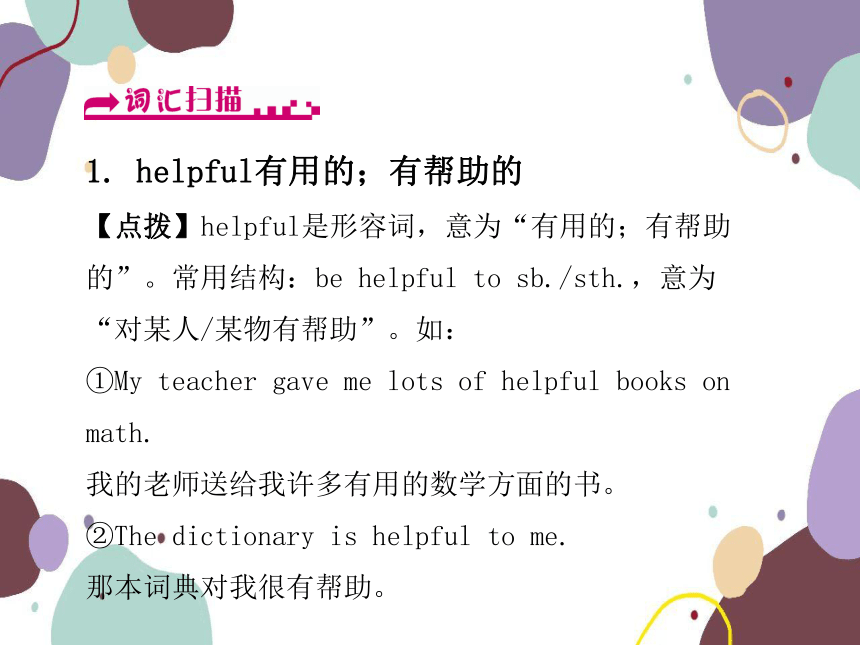
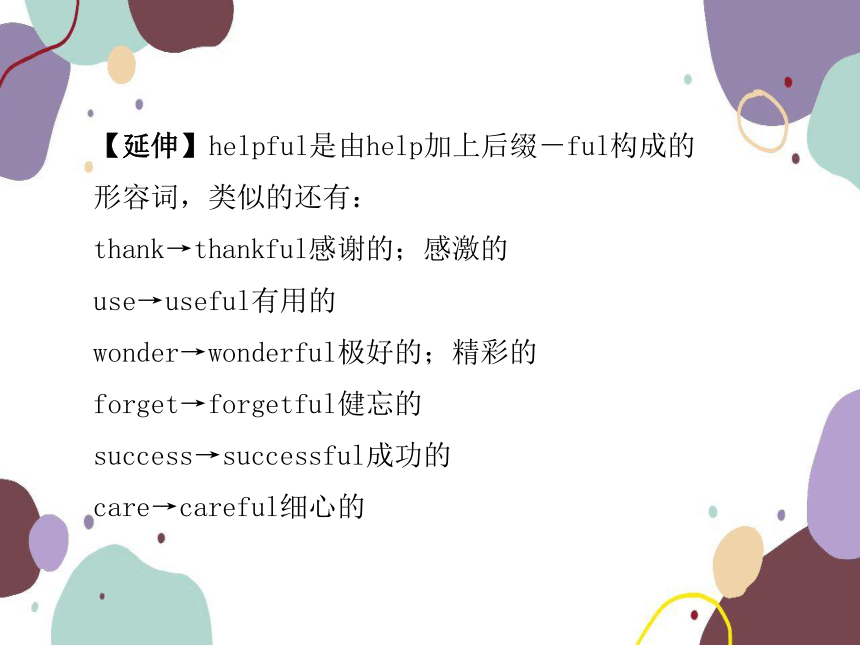
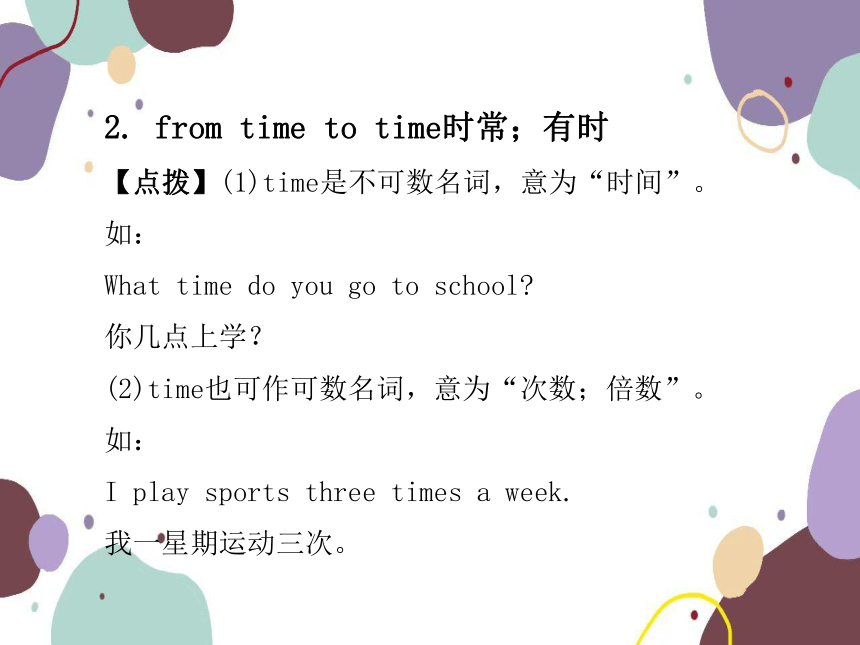
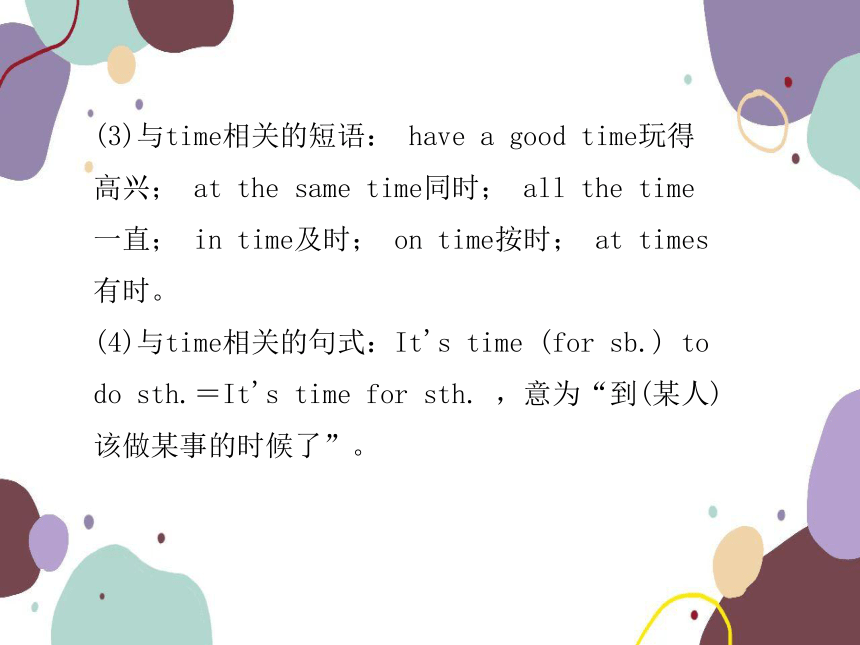

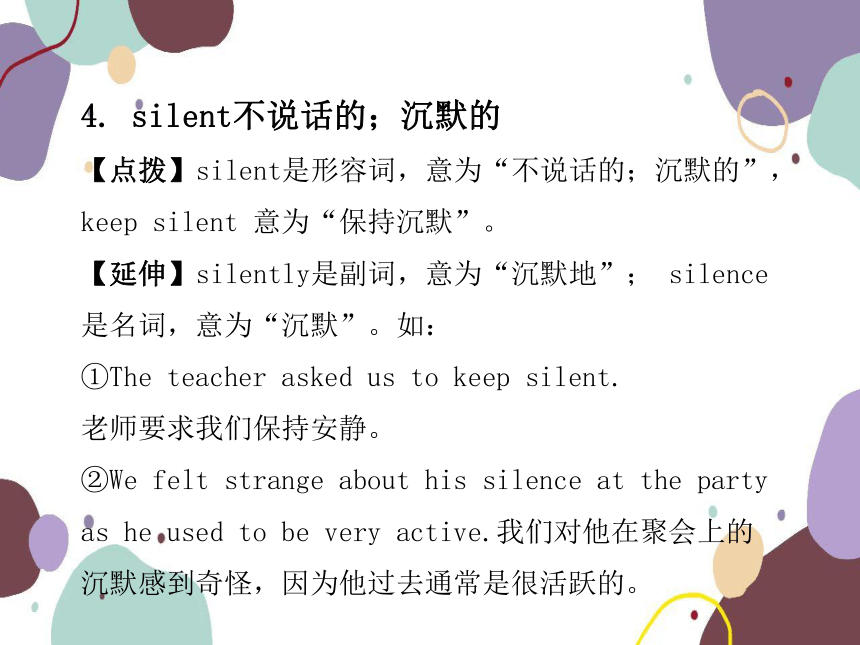
文档简介
(共14张PPT)
Unit 4 I used to be afraid of the dark.
Period 1(Section A 1a-2d)
教学目标 1. 能够表述自己现在和过去在外貌、性格、爱好等方面的变化2. 通过观察和交流,关注家人、朋友以及周围环境的变化3. 通过展示旧照片和小时候的录音录像帮助学生拓宽思路
重点词汇 humorous, silent, helpful, from time to time, score
重点句型 ①She used to have straight hair. Now she has short hair.②—Did Mario use to be short —Yes, he did./No, he didn't.
难点 You used to be short, didn't you?
1. helpful有用的;有帮助的
【点拨】helpful是形容词,意为“有用的;有帮助的”。常用结构:be helpful to sb./sth.,意为“对某人/某物有帮助”。如:
①My teacher gave me lots of helpful books on math.
我的老师送给我许多有用的数学方面的书。
②The dictionary is helpful to me.
那本词典对我很有帮助。
【延伸】helpful是由help加上后缀-ful构成的形容词,类似的还有:
thank→thankful感谢的;感激的
use→useful有用的
wonder→wonderful极好的;精彩的
forget→forgetful健忘的
success→successful成功的
care→careful细心的
2. from time to time时常;有时
【点拨】(1)time是不可数名词,意为“时间”。如:
What time do you go to school
你几点上学?
(2)time也可作可数名词,意为“次数;倍数”。如:
I play sports three times a week.
我一星期运动三次。
(3)与time相关的短语: have a good time玩得高兴; at the same time同时; all the time一直; in time及时; on time按时; at times有时。
(4)与time相关的句式:It's time (for sb.) to do sth.=It's time for sth. ,意为“到(某人)该做某事的时候了”。
3. humorous有幽默感的;滑稽有趣的
【点拨】humorous是形容词,意为“有幽默感的;滑稽有趣的”,是由humor+-ous(形容词后缀)构成的派生词。其名词形式为humor,意为“幽默;滑稽”。如:
She likes telling jokes. She is a humorous person in our minds.
她喜欢讲笑话。她在我们脑海中是个富有幽默感的人。
4. silent不说话的;沉默的
【点拨】silent是形容词,意为“不说话的;沉默的”,keep silent 意为“保持沉默”。
【延伸】silently是副词,意为“沉默地”; silence是名词,意为“沉默”。如:
①The teacher asked us to keep silent.
老师要求我们保持安静。
②We felt strange about his silence at the party as he used to be very active.我们对他在聚会上的沉默感到奇怪,因为他过去通常是很活跃的。
5. score 得分;进球
【点拨】score可以作名词,作名词时是可数名词,意为“(考试)分数;成绩”,还意为“(比赛中的)得分;比分”。如:①He studied hard and got good scores on his exams.他学习努力,考试成绩优秀。
②What's the score 得分是多少?
③The team won by a score of 7 to 5.这个队以7比5获胜。
【延伸】score 作动词时,意为“得分”。如:
I scored three times and we won the match!
我三次得分,我们赢了比赛!
Mario, you used to be short, didn't you
马里奥,你过去很矮,不是吗?
【点拨】(1)used to意为“过去常常”,后接动词原形,表示过去的动作或状态。如:
He used to play basketball at school.
他过去常在学校里打篮球。
【延伸】used to 的疑问句及否定句结构:
(1)疑问句由Did...use to...?或Used...to...?构成。如:
He used to play soccer.他过去常踢足球。
→Did he use to play soccer?=Used he to play soccer 他过去常踢足球吗?
(2)否定句由didn't use to...或used not to...(usedn't to...)构成。如:
I used to be very quiet.我过去很文静。
→I didn't use to be very quiet.=I used not to be very quiet.我过去不是很文静。
【辨析】used to do sth., be/get used to (doing) sth.与be used to do sth.
(1)used to do sth.意为“过去常做某事”,只用于过去时态。如:
I used to collect stamps when I was a child.
我小时候经常集邮。
(2)be used to (doing) sth.意为“习惯于(做)某事”,可用于现在、过去、将来等多种时态。如:
He is used to going to sleep early.
他习惯早睡。
(3)be used to do sth.意为“被用于做某事”,是被动语态,不定式表示目的,可用于多种时态。如:
Wood is used to make houses.
木材被用来造房子。
【点拨】(2)本句是反意疑问句。反意疑问句的一般构成方法是:陈述句部分为肯定形式,则疑问句部分为否定形式;陈述句部分为否定形式,则疑问句部分为肯定形式。
如:①They are going to Shanghai tomorrow, aren't they 他们明天要去上海,不是吗?
②He came early, didn't he
他来得很早,不是吗?
③You won't be late for the meeting, will you
你开会不会迟到的,是吗?
在回答反意疑问句时,如果答案是肯定的,前面须用yes,否定要用no。当陈述部分为否定句时,要特别注意,这时英语和汉语翻译是不一样的。
如:
—You didn't finish your homework, did you
你没有完成作业,是吗?
—No, I didn't./Yes, I did.
是的,我没完成。/不,我完成了。
Unit 4 I used to be afraid of the dark.
Period 1(Section A 1a-2d)
教学目标 1. 能够表述自己现在和过去在外貌、性格、爱好等方面的变化2. 通过观察和交流,关注家人、朋友以及周围环境的变化3. 通过展示旧照片和小时候的录音录像帮助学生拓宽思路
重点词汇 humorous, silent, helpful, from time to time, score
重点句型 ①She used to have straight hair. Now she has short hair.②—Did Mario use to be short —Yes, he did./No, he didn't.
难点 You used to be short, didn't you?
1. helpful有用的;有帮助的
【点拨】helpful是形容词,意为“有用的;有帮助的”。常用结构:be helpful to sb./sth.,意为“对某人/某物有帮助”。如:
①My teacher gave me lots of helpful books on math.
我的老师送给我许多有用的数学方面的书。
②The dictionary is helpful to me.
那本词典对我很有帮助。
【延伸】helpful是由help加上后缀-ful构成的形容词,类似的还有:
thank→thankful感谢的;感激的
use→useful有用的
wonder→wonderful极好的;精彩的
forget→forgetful健忘的
success→successful成功的
care→careful细心的
2. from time to time时常;有时
【点拨】(1)time是不可数名词,意为“时间”。如:
What time do you go to school
你几点上学?
(2)time也可作可数名词,意为“次数;倍数”。如:
I play sports three times a week.
我一星期运动三次。
(3)与time相关的短语: have a good time玩得高兴; at the same time同时; all the time一直; in time及时; on time按时; at times有时。
(4)与time相关的句式:It's time (for sb.) to do sth.=It's time for sth. ,意为“到(某人)该做某事的时候了”。
3. humorous有幽默感的;滑稽有趣的
【点拨】humorous是形容词,意为“有幽默感的;滑稽有趣的”,是由humor+-ous(形容词后缀)构成的派生词。其名词形式为humor,意为“幽默;滑稽”。如:
She likes telling jokes. She is a humorous person in our minds.
她喜欢讲笑话。她在我们脑海中是个富有幽默感的人。
4. silent不说话的;沉默的
【点拨】silent是形容词,意为“不说话的;沉默的”,keep silent 意为“保持沉默”。
【延伸】silently是副词,意为“沉默地”; silence是名词,意为“沉默”。如:
①The teacher asked us to keep silent.
老师要求我们保持安静。
②We felt strange about his silence at the party as he used to be very active.我们对他在聚会上的沉默感到奇怪,因为他过去通常是很活跃的。
5. score 得分;进球
【点拨】score可以作名词,作名词时是可数名词,意为“(考试)分数;成绩”,还意为“(比赛中的)得分;比分”。如:①He studied hard and got good scores on his exams.他学习努力,考试成绩优秀。
②What's the score 得分是多少?
③The team won by a score of 7 to 5.这个队以7比5获胜。
【延伸】score 作动词时,意为“得分”。如:
I scored three times and we won the match!
我三次得分,我们赢了比赛!
Mario, you used to be short, didn't you
马里奥,你过去很矮,不是吗?
【点拨】(1)used to意为“过去常常”,后接动词原形,表示过去的动作或状态。如:
He used to play basketball at school.
他过去常在学校里打篮球。
【延伸】used to 的疑问句及否定句结构:
(1)疑问句由Did...use to...?或Used...to...?构成。如:
He used to play soccer.他过去常踢足球。
→Did he use to play soccer?=Used he to play soccer 他过去常踢足球吗?
(2)否定句由didn't use to...或used not to...(usedn't to...)构成。如:
I used to be very quiet.我过去很文静。
→I didn't use to be very quiet.=I used not to be very quiet.我过去不是很文静。
【辨析】used to do sth., be/get used to (doing) sth.与be used to do sth.
(1)used to do sth.意为“过去常做某事”,只用于过去时态。如:
I used to collect stamps when I was a child.
我小时候经常集邮。
(2)be used to (doing) sth.意为“习惯于(做)某事”,可用于现在、过去、将来等多种时态。如:
He is used to going to sleep early.
他习惯早睡。
(3)be used to do sth.意为“被用于做某事”,是被动语态,不定式表示目的,可用于多种时态。如:
Wood is used to make houses.
木材被用来造房子。
【点拨】(2)本句是反意疑问句。反意疑问句的一般构成方法是:陈述句部分为肯定形式,则疑问句部分为否定形式;陈述句部分为否定形式,则疑问句部分为肯定形式。
如:①They are going to Shanghai tomorrow, aren't they 他们明天要去上海,不是吗?
②He came early, didn't he
他来得很早,不是吗?
③You won't be late for the meeting, will you
你开会不会迟到的,是吗?
在回答反意疑问句时,如果答案是肯定的,前面须用yes,否定要用no。当陈述部分为否定句时,要特别注意,这时英语和汉语翻译是不一样的。
如:
—You didn't finish your homework, did you
你没有完成作业,是吗?
—No, I didn't./Yes, I did.
是的,我没完成。/不,我完成了。
同课章节目录
- Unit 1 How can we become good learners.
- Section A
- Section B
- Unit 2 I think that mooncakes are delicious!
- Section A
- Section B
- Unit 3 Could you please tell me where the restroom
- Section A
- Section B
- Unit 4 I used to be afraid of the dark.
- Section A
- Section B
- Unit 5 What are the shirts made of?
- Section A
- Section B
- Review of Units 1-5
- Unit 6 When was it invented?
- Section A
- Section B
- Unit 7 Teenagers should be allowed to choose their
- Section A
- Section B
- Unit 8 It must belong to Carla.
- Section A
- Section B
- Unit 9 I like music that I can dance to.
- Section A
- Section B
- Unit 10 You're supposed to shake hands.
- Section A
- Section B
- Review of Units 6-10
- Unit 11 Sad movies make me cry.
- Section A
- Section B
- Unit 12 Life is full of the unexpected
- Section A
- Section B
- Unit 13 We're trying to save the earth!
- Section A
- Section B
- Unit 14 I remember meeting all of you in Grade 7.
- Section A
- Section B
- Review of Units 11-14
